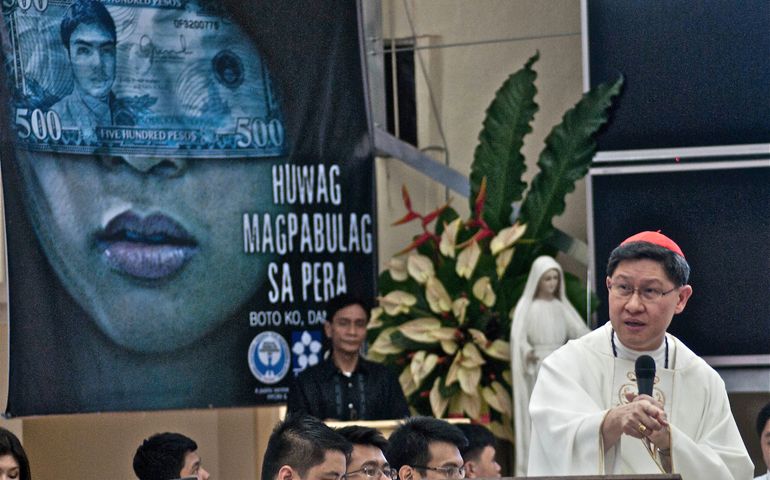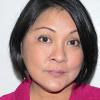
Cardinal Luis Antonio Tagle blesses the command center of the unofficial parallel count of the Parish Pastoral Council for Responsible Voting, where a tarp displays its anti-vote-buying campaign slogan, "Do not be blinded by money." (Roy Lagarde)
Leading church and laypeople have called for faith, hope and vigilance in the homestretch of campaigning for Monday's midterm elections, which could determine whether President Benigno Aquino III's reform agenda moves forward or stalls.
It will also be the second election using the nationwide Automated Election System that caused controversy three years ago, when the accuracy and reliability of the voting machines were called into question.
"Those of you who look so tired, please smile and have faith," Cardinal Luis Antonio Tagle told volunteers and officials in his homily for the Mass and blessing of the Parish Pastoral Council for Responsible Voting (PPCRV) Command Center on Tuesday.
"Jesus has saved the world. He will not abandon us. And when we are at risk, he will not allow that we will dissipate and die," the cardinal said.
The council, a lay-led citizens' election watchdog accredited by the Commission on Elections, was setting up its hub for its parallel quick count of votes at Pius XII Catholic Center in Paco, Manila. The council has more than 320,000 volunteers, including laypeople, nuns, seminarians and priests who will monitor voting in close to 900 election hotspots.
Former Philippine Ambassador to the Holy See Henrietta de Villa, who had been president of the Council of the Laity that helped establish the voting pastoral council in 1991, serves as its national coordinator.
Based on the election commission's records, more than 52 million registered voters are expected to trek to polling precincts around the country to cast their ballots May 13.
'Important' elections
Monday's polls aim to elect 12 of the country's 24 senators, 292 seats for House representatives for geographical districts and accredited Party Lists representing sectors that are marginalized or groups working on special concerns, such as sanctity of human life. They will serve from June 30 to June 30, 2016.
Voters are also to elect provincial governors, town and city mayors, councilors and other officials of the nation's more than 41,000 local government units.
"Midterm elections, for a president who has a clear reform program, particularly in the area of governance, are almost as important as the actual presidential election mainly because there is no re-election for a Philippine president," sociologist Randolf David told NCR on Thursday.
"This means [the president] cannot embark on any long-term reform program," David said. "Normally, after three years, the chief executive becomes a lame-duck president who starts compromising and might even worry about political survival."
He noted that it is unusual for a president to play an active part in midterm elections, as Aquino has been doing in past months.
"Usually, [presidents] don't want to be seen as partisan because they want the cooperation of everybody until the end of their six-year term," David said.
Aquino, however, has been speaking at campaign rallies and raising hands of candidates onstage.
"He's serious about his own reform program, so he's going all-out to make sure he continues to have cooperation from Congress," David said.
Aquino can afford to do this. David notes, "He has been exceptional in the sense that it's been three years since he was elected president and his approval and trust ratings remain high. They're higher even than those attained by his mother," the late President Corazon Aquino, described as "icon of Philippine democracy."
"No president after martial law [1972-1981] has maintained such high levels as Noynoy [Benigno Aquino III]. There's no corruption suspicion hounding him, so he has confidence in pushing for certain changes and he's quite decisive, even stubborn."
However, Aquino needs House representatives' support because his own Liberal Party is not the majority in Congress' Lower House, David said. In the Senate race, front-runners are also not members of the administration's Liberal Party.
For Monday's senatorial elections, his Liberal Party is backing candidates in the Team PNoy coalition with four other parties, one other coalition and some candidates running independently of any party.
"Aquino has gone all-out to campaign for front-runners, just to make sure that when the new Congress begins, he's assured of even a simple majority, hopefully unshakable, because it looks like there are more reforms up their sleeves, particularly economic reform," David said.
He said House representatives are "pretty easy to deal with," noting "they're dependent on Malacanang [the presidential office], they're dependent on the president for budget release, for pork barrel, etc."
Senators, meanwhile tend to be more "recalcitrant" because each one of them "imagines himself or herself of presidential timbre." The incumbent president gets some cooperation, "but it's always of a dicey type," David said.
Nonetheless, David said he is "thankful" and optimistic.
"I think the next three years are going to be quite bright, mainly because you have a credible president -- particularly to the international community. That spells a big difference."
Church role
Bishops stressed the Parish Pastoral Council for Responsible Voting's traditional role and responsibility to work for "clean, honest, accountable, meaningful and peaceful" elections in 2013. In a message sent to the recent PPCRV Command Center blessing, Archbishop Angel Lagdameo of Iloilo, former Philippine bishops' conference president and chairman of its Commission on Laity, reminded volunteers and officers, "The great objective of PPCRV is to help, only to help, the election be as credible as it should be for the common good."
Police reports underscore the risks confronting volunteers, who Lagdameo called "hidden heroes." As of Thursday, 44 people have been recorded as killed in poll-related violence. The Philippine National Police listed 66 election-related violent incidents involving 107 victims from the start of the election period (Jan. 13) to May 8. Police have arrested 3,049 people for violating the election commission's gun ban in force Jan. 13 to May 7.
Violence is not the only problem. Ana De Villa Singson, PPCRV's media and communications director, said, "One glaring fact that came out in all the reports (from dioceses in 2010) was that there was an explosion of vote-buying."
Singson said "retail buying" or negotiation between two persons had shifted to "wholesale buying." In 2010, "They were buying entire families," she said.
Cheating is another problem. Automated Election System has been questioned by various groups and the Catholic Bishops' Conference of the Philippines about transparency, alleged anomaly, security of votes and other issues faced in the 2010 national elections.
Dissatisfied with PPCRV's response to the questions, Archbishop Ramon Arguelles of Lipa withdrew support from the group and said he would name candidates he is supporting. His diocese organized its own election monitoring group.
CBCP's president, Archbishop Jose Palma, however, had written that he continues to recognize PPCRV's lead in working for clean elections.




